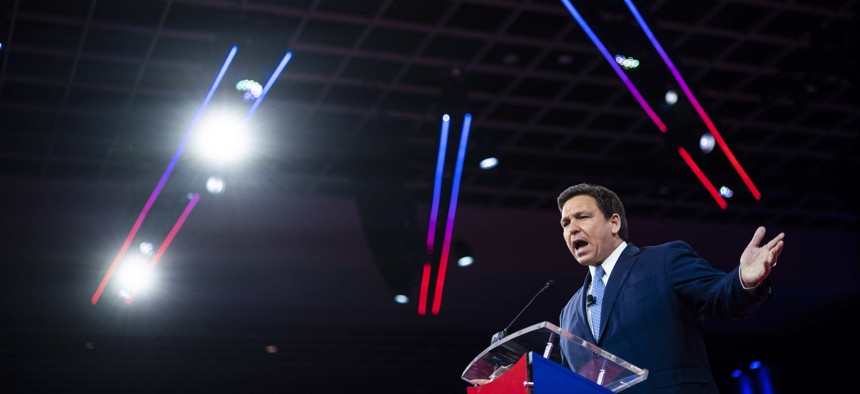The Latest Republican State Laws Undercutting Democratic Cities

Florida Gov. Ron DeSantis speaks during the first day of the Conservative Political Action Conference CPAC on Thursday, Feb. 24, 2022 in Orlando, Florida. Photo by Jabin Botsford/The Washington Post via Getty Images
States have used preemption to undermine local authority on public school curriculum, LGBTQ civil rights, Covid-19 related health measures and voting rights, according to a new report.
Republican state lawmakers have stepped up their use of a legislative strategy designed to undercut policies enacted by leaders in Democratic cities.
The tactic, known as preemption, has been deployed hundreds of times since the beginning of the year, according to a new report by the Local Solutions Support Center, a group that tracks preemption issues.
States have used preemption to undermine local authority on public school curriculum, LGBTQ civil rights, Covid-19 related health measures and voting rights.
“State legislators are passing laws that prevent local leaders from making policies that are best for their communities,’’ said Francesca Weaks, state campaign consultant for the center. “Those communities are often [made up of] people of color, LGBTQ people and low-wage workers.”
Preemption isn’t a new tactic: It’s been used to undercut the decision-making authority of blue cities in red states dozens of times through the years, on everything from minimum wage laws to immigration policy.
But Republican legislatures and governors have turned to the tactic with new vigor, a trend the center attributes partly to the pandemic.
“The surge of abusive preemption legislation across states is not coincidental,’’ the report states. “Many state lawmakers see preemption bills as an opportunity to punish local governments who have, over the past two years, worked to keep their communities safe from the Covid-19 pandemic by implementing mask mandates and vaccine requirements, explored alternatives to community safety beyond or in addition to policing, and attempted to make voting more accessible for their citizens.”
Legislation that critics derided as the “Don’t Say Gay” bill, which was passed by Florida lawmakers and signed into law by Republican Gov. Ron DeSantis in late March, is probably the best-known example of preemption in recent months.
The measure, formally known as the Parental Rights in Education Act, prohibits classroom discussion of gender and identity for children from kindergarten to third grade, or in a manner that is not “age appropriate or developmentally appropriate” for students.
It also requires schools to notify parents if the school offers their children health or support services, and allows parents to sue school districts that are found to violate the law.
Critics say the measure undermines support for LGBTQ students, diminishes families with gay, lesbian, transgender and nonbinary parents and undercuts the authority of locally elected school boards to set policy.
More than a dozen states have proposed copycat legislation that echoes the Florida law.
Other laws enacted this year also seek to exert state control over education, including a Missouri measure that bars the use of “The 1619 Project” in schools and empowers the state attorney general to monitor compliance. (School districts that violate the law could see their state funding allocation cut by 50%.)
The Pulitzer Prize-winning “1619 Project” was produced by The New York Times in 2019 to mark the 400th anniversary of the first enslaved people arriving in the Virginia colony. It examines American history through the lens of slavery and highlights the contributions of Black Americans.
Red states have also sought to preempt local authority on issues relating to transgender athletes participating in high school sports. The "Save Women’s Sports" bill, signed into law by Republican Gov. Doug Ducey of Arizona, restricts transgender girls from participating on girls teams at public high schools and private schools that compete with public schools.
If a school does not comply with the ban, any student can bring a lawsuit against the district by claiming they suffered “direct or indirect harm.”
Other bills are aimed to undercut local decision-making regarding public health policy. The “Unmask Georgia Students Act,’’ signed by Gov. Brian Kemp, bars school authorities from requiring students to wear masks, unless their parents require it. The law also prohibits schools from punishing students who opt out of mask mandates.
NEXT STORY: Jail voting expands in Illinois





